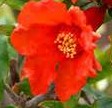 The pomegranate (Punica granatum) is a member of the Lythraceae family that includes crape myrtle, loosestrife, and henna. It is a multi-stemmed deciduous shrub or small tree growing sixteen to twenty-six feet tall with spiny branches. The glossy dark green leaves, are narrow and one to three inches long. The bright red flowers are one inch in diameter and are borne singly or in clusters through out the summer. The fruits, produced in the fall, are two to four inches in diameter and ripen to yellow tinged with red. They contain from 200 to 1400 seeds each contained in a juicy, edible sac. Pomegranates are hardy in USDA zones 8-11 and like full sun and organically rich, dry to medium moist, well-drained soil.
The pomegranate (Punica granatum) is a member of the Lythraceae family that includes crape myrtle, loosestrife, and henna. It is a multi-stemmed deciduous shrub or small tree growing sixteen to twenty-six feet tall with spiny branches. The glossy dark green leaves, are narrow and one to three inches long. The bright red flowers are one inch in diameter and are borne singly or in clusters through out the summer. The fruits, produced in the fall, are two to four inches in diameter and ripen to yellow tinged with red. They contain from 200 to 1400 seeds each contained in a juicy, edible sac. Pomegranates are hardy in USDA zones 8-11 and like full sun and organically rich, dry to medium moist, well-drained soil.
Shakespeare mentions the pomegranate in three plays.
In All’s Well that Ends Well (act ii, sc 3, 275) the old Lord Lafew tells Parolles, a friend of Bertram ,Count of Rousillon;
Go to, sir; you were beaten in Italy for picking a
Kernel out of a pomegranate; you are a vagabond and
No true traveler: you are more saucy with lords
and honourable personages than the commission of your
birth and virtue gives you heraldry.
As Romeo prepares to leave Juliet and begin his exile, Juliet tells persuade him to stay longer;
Wilt thou be gone? It is not yet near day.
It was the nightingale, and not the lark,
That pierced the fearful hollow of thine ear.
Nightly she sings on yon pomegranate tree.
Believe me, love, it was the nightingale.
(Romeo and Juliet (act iii, sc. 5, 2)
In 1st Henry IV, (act ii, sc 4, 41) the waiter, Francis, says as he responds to the summons of Poin, a highwayman drinking buddy of Prince Harry;
Anon, anon, sir.—Look down into the Pomgarnet,
Ralph.
The pomegranate goes back to ancient times. It is native to Iran and northeast Turkey was widely cultivated in the Middle East, parts of Asia, and the Mediterranean. It was known in ancient Egypt and Mesopotamia and is mentioned numerous times in the Old Testament. Both the Greeks and Romans knew the pomegranate and incorporated it into the myth of Ceres and Proserpine. The sixteenth century herbalist, Gerard, comments that it grows well in hot countries but he probably did not grow any as the pomgranates are believed to have been introduced into England in themed seventeenth century.
The origin of the genus name, Punica, goes back to Roman times when it was named for the country where the Romans first found the plants, Phoenicia. The specific name, granata, comes from the Latin word meaning “many seeded’. Pomgranate may be derived from the French word pomme meaning apple, combined with the Latin “many seeded”.